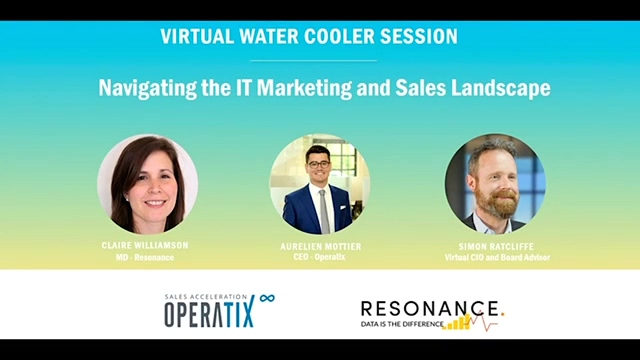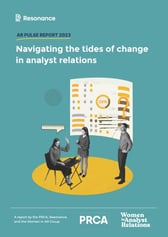4 min read
WATER-COOLER SESSION: HOW TO MARKET AND SELL TO IT DECISION MAKERS DURING THE PANDEMIC
Claire Williamson : Jun 2, 2020 3:28:09 PM

Bringing the community together during this time
Following our research of IT decision makers and their buying intentions during the pandemic, Resonance and Operatix came together for a virtual water-cooler session. We invited our B2B technology sales, marketing and PR communities to join us. Over 40 people joined our discussion on 14th May and we heard from Resonance MD, Claire Williamson on marketing, PR and communications; Operatix CEO, Aurelien Mottier on marketing and sales; and virtual CIO and board advisor, Simon Ratcliffe on what the IT decision makers are doing and what they expect from brands during this time.
The top takeaways from the session were:
- The pandemic has led to three buying stages: Survive, Optimise and Transform
- The relationship between the business and IT has changed and so has the internal buying process
- CIOs and IT managers are looking to their communities for support and want helpful advice
- Businesses are starting to understand the need for long term thinking
- For Sales & Marketing teams this means an even stronger focus on ABX (Account-based Everything) where a tailored, personal and human approach should be used to show value to customers.
The three buying stages: survive, optimise, transform
There was consensus among the group that businesses are moving through a series of phases. In the first two weeks, businesses pressed the pause button as they identified their risk. There has since been a realisation that we need to think longer term. We have a duty to ensure we continue to market and sell for the long-term success of the organisations we work with and to help the economy get back on its feet.
Simon Ratcliffe: “At the beginning, we went into survival mode to get people working from home. We had to buy things to get everything working. And that survival mode is where a lot of the initial buying behaviour seen in the survey came from.
“The interesting thing now is, we’re seeing the organisations that have gone through survival mode, move to the second phase of ‘optimising’. Organisations are now largely functioning; they have their employees working effectively from home. Even the ones that have furloughed staff are turning to optimising, which is driving a second phase of buying behaviour. These organisations are saying to themselves ‘it's okay we've survived. Now let's make everything work a little bit better’”.
Aurelien Mottier: “In the first two weeks of lockdown we saw lots of demos, meetings and deals being pushed back as organisations figured things out. However, to Simon’s point earlier, we also saw speed in some of the important decisions, especially for some of our security clients who have real value in a working from home world.”
Businesses are also realising that the world has shifted. Business operations and business models have had to react quickly to a world where socially distanced consumers’ and clients’ expectations have evolved. It is important that businesses monitor and innovate for the new reality.
Claire Williamson: “It's about understanding how consumption patterns are evolving and fine tuning the business and from our perspective as the marketers, making sure that we understand the audience our customers are ultimately selling to and how the consumers adapting during this time. And how it will change for the long term.”
The view from sales and marketing marries well with that of the office of the CIO. Simon Ratcliffe shared the three stages he has seen: Survive, Optimise, Transform. The buying intentions survey of 100 CIOs and IT decision makers also confirmed this view.
A shift in the relationship between business and IT
As businesses needed to quickly get up to speed with the new working realities brought about by social distancing, the relationship has shifted between IT and the business, with increased autonomy for IT decision makers.
Simon: “The interesting thing I’ve seen from the CIOs I work with is that they were not asking for business permission to spend money to get things into place. They were just going and doing it and for once the business actually turned its view around. It wasn't asking for ROI, it wasn't asking for KPIs, it wasn’t asking for a business case, it was just saying do it and we’ll figure the outcome later.”
“This is signalling a shift in where we're going. We are now moving into much more outcome-based buying and it's quicker.”
Community and spirit of sharing is important.
Community and peer learning has also played an increasingly important role during the pandemic.
“CIOs are getting together and sharing in forums and recommending people to each other. And it’s about sometimes engaging in those forums. We are open to external parties coming in there and sharing ideas and case studies. I’ve seen an increase in this. I have spent more time talking to other groups than prior to the pandemic.”
Simon Ratcliffe
It is also important that at the transform stage, vendors and service providers deliver the advice and thought leadership needed, and that they work with their sales and marketing teams for the insights from the wider market. Key areas to understand include:
- What is your prospect is looking for?
- What are your competitors doing?
- What challenges do they currently have?
Providing helpful insights to your prospects into what their future organisation will look like and what their stakeholders are looking for, can place yourself at the heart of influence and begin positioning yourself as a trusted advisor.
The importance of an Account-based approach for Sales & Marketing Teams
Companies are seeing their total addressable market shrinking and need to review their approach to focus their efforts on targeting industries and regions less affected by the crisis.
This new reality demands an even stronger focus on ABX (Account-based Everything).
It’s crucial that companies invest in gathering intelligence on the still viable segments of their target account list and double down on a tailored, personal and human approach. This will allow marketers to not only open up green field accounts, but also support their sales teams in identifying other relevant personas and facilitating consensus in the different buying centres.
CIOs have shown their power
Simon Ratcliffe made an insightful point that CIOs have proven their value to management by acting quickly during the crisis, implementing working from home infrastructure. They have built trust with the business and this is potentially a turning point in the relationship between IT and the business:
“We've still got a little bit of that carte blanche there. The business are very Pro IT going out and doing things. The CIO and IT departments have this autonomy like never before.”
If you'd like more information, contact hello@resonancecrowd.com



 "The intricacies of the data-driven landscape is written into the DNA of Resonance. We are built for the data economy."
"The intricacies of the data-driven landscape is written into the DNA of Resonance. We are built for the data economy.".jpeg?width=250&height=181&name=AdobeStock_565367297%20(1).jpeg)
 "In Tech PR we have a front row seat to the changing technology landscape. From Generative AI to Quantum, it's our job to insert our clients' voices into the narrative"
"In Tech PR we have a front row seat to the changing technology landscape. From Generative AI to Quantum, it's our job to insert our clients' voices into the narrative"



 "In a world where the only constant is change, how do tech brands stay one step ahead of the market? That's where Resonance comes in"
"In a world where the only constant is change, how do tech brands stay one step ahead of the market? That's where Resonance comes in".png?width=219&height=219&name=Seb%20Moss%20wavelength%20thumbnail%20(1).png)

 "Resonance is a group of technology, business and communications experts"
"Resonance is a group of technology, business and communications experts"

